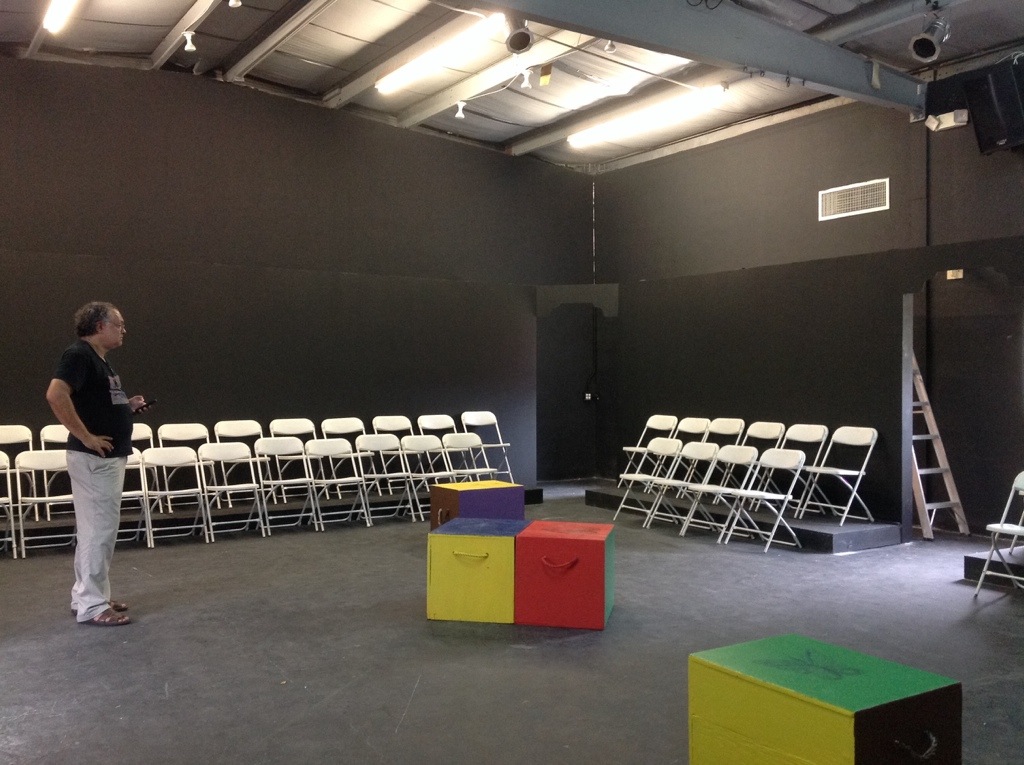Notebook of a Return to our Theatre Home
I'm sitting in the dark lighting booth of the Dundas Theatre, running lights and sound for the Ringplay production of 12 Angry Men. The play has an easy first act for me: lights up at the beginning, fast fade and music at the end. All the focus is on the stage.It's coming up on thirty years since I first started my apprenticeship in theatre on the Dundas stage. I returned home from university in 1986 with an intention of writing plays. It had something to do with Ngugi wa Thiong'o, but that's another story; but somewhere in the back of my mind I was aware that if I wanted to write plays I should have some experience in being in them. So in January 1987 I made my debut as part of the Dundas Repertory Season. And so began what would become an unofficial career.In the beginning, all was well. I started on stage, although my real interest was behind the scenes. I had spent two years at university learning how to stage manage productions, serving as regisseuse for the St. Michael's French theatre (and, yes, doing it all in French. Um.), and I had also spent two years doing creative writing (which was a mere seminar as part of my Literature degree, as Creative Writing was not, in those days at the self-important University of Toronto, a valid degree) and coming to the conclusion that if I wrote prose I would probably never be read in my own country. I was working on adapting one of the stories I produced for my creative writing seminar into a play, and I wanted to know first-hand what I ought to think about. And so I found myself one summer at a workshop being given at the Dundas by Philip Burrows.The workshop changed my life, though I didn't know it then. It threw me so far out of my comfort zone it took me a good decade or so to find my way back. It also brought into my life the people I consider my closest circle of friends outside of family--and, thanks to subsequent events, it made some of those people my actual family too. Jane Poveromo, Sammie Bethell, Marcel Sherman, Cookie Allens, David Burrows, Gavin Collins, Alayne Patur and, of course Philip Burrows--these were the people I met for the first time in that workshop. We did exercises and we did monologues, and then we were presented with monologues and scenes that were specially written for the workshop, pieces written by Winston Saunders at Philip's request. Those monologues would eventually become I, Nehemiah, Remember When..., but I didn't get to do any, because I took up an adjunct position at COB, teaching West Indian Literature (and that particular class was another story) and had to drop out; the class clashed with Philip's workshop.But the workshop led to a call from Philip, just before Christmas. "I need a stage manager," he told me. "I'm holding a reading for a play and I want you to come out." So I turned out for the reading, which was held in the half-dark on the Dundas stage. The play was a peculiar piece. It was called The Rimers of Eldritch and it was by an American playwright I had never heard of, but whom I would later count among my favourite writers: Lanford Wilson. It was about small town midwestern America, a place which seemed ordinary but which was sinister, and was about a rape and a murder and the injustice that goes with prejudice. And it was not linear, and I loved it. I loved the reading and I wanted to be the stage manager.And at the end of the reading, Philip said to me:"I guess you know you've got the part."I spent the next six weeks in shock. But the rehearsal process introduced me to more people, luminaries and names of the local theatre. There were David and Gavin and Alayne and Cookie and Marcel and Sammie and Jane and me, all the people from the workshop. But there were other people in it too, people I had seen on stage or had heard of but who hadn't been in the workshop: Angela Scott and Jeanne Thompson and Heather Thompson and Bonny Byfield and Rudy Levarity and Stephen Burrows and Liz Gottlieb and not least of all Anthony Delaney. And we worked together to create a strange and haunting and memorable ensemble piece that marked my first serious appearance (with actual lines) on the Dundas stage.But this is a digression. I was talking about our return to the Dundas, not my beginning there. I'm sitting in the lighting booth watching 12 Angry Men. For reasons that are too long and complex to go into right now, the people I met in 1987 left the Dundas (or, more accurately, were no longer needed by the Dundas). We moved on, formed our own independent company, went on to produce theatre in other forms and other places, establishing among other things Shakespeare in Paradise. We were away for some 16 years. And then, this past March, we took over the management of the theatre. I was going to say "again" but that wouldn't strictly be accurate; we managed the Season before, which occupied the Dundas for between five and nine months of the year, but we never managed the theatre itself. Now, though, we are the managers of the theatre as a whole. And it is like—it is in fact—a return home.Watch that space.
